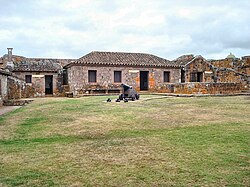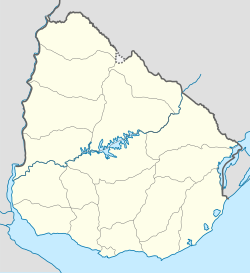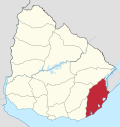Dieciocho de Julio: Difference between revisions
m Dating maintenance tags: {{Cn}} |
m added space |
||
| Line 36: | Line 36: | ||
==Geography== |
==Geography== |
||
The town is located about{{convert|9|km}} west of [[Chuy]] along Route 19. The next village to its west is [[San Luis al Medio]]. |
The town is located about {{convert|9|km}} west of [[Chuy]] along Route 19. The next village to its west is [[San Luis al Medio]]. |
||
==History== |
==History== |
||
Latest revision as of 08:51, 11 January 2024
Dieciocho de Julio
18 de Julio | |
|---|---|
Town | |
 Fuerte San Miguel | |
| Coordinates: 33°41′0″S 53°33′20″W / 33.68333°S 53.55556°W | |
| Country | |
| Department | Rocha Department |
| Population (2011) | |
• Total | 977 |
| Time zone | UTC -3 |
| Postal code | 27101 |
| Dial plan | +598 4474 (+4 digits) |
| Climate | Cfa |
Dieciocho de Julio or 18 de Julio is a small town in the Rocha Department of southeastern Uruguay.
Geography
[edit]The town is located about 9 kilometres (5.6 mi) west of Chuy along Route 19. The next village to its west is San Luis al Medio.
History
[edit]On 12 June 1909, the populated centre known as "San Miguel" was renamed and declared a "Pueblo" (village) by the Act of Ley N° 3.495.[1] Its status was elevated to "Villa" (town) on 20 June 1961 by the Act of Ley Nº 12.876.[2]
Population
[edit]In 2011 18 de Julio had a population of 977.[3]
| Year | Population |
|---|---|
| 1963 | 749 |
| 1975 | 743 |
| 1985 | 872 |
| 1996 | 1,139 |
| 2004 | 1,191 |
| 2011 | 977 |
Source: Instituto Nacional de Estadística de Uruguay[1]

Features
[edit]In the town, there is the Fortin de San Miguel, a castle which has been converted to an inn and hotel.[citation needed]
Fuerte San Miguel
[edit]At the east end of the town is a hill on which the Fuerte San Miguel is situated, a prominent fort during colonial times, built in 1737 by the Portuguese. Between the fort and the town is also the Criollo Museum, which displays outdoors replicas of the life of the gauchos, as well as indoors exhibits of the carts and carriages of the times.
References
[edit]- ^ a b "Statistics of urban localities (1963–2004)" (PDF). INE. 2012. Archived from the original (PDF) on 2009-11-13. Retrieved 5 September 2012.
- ^ "LEY N° 12.876". República Oriental del Uruguay, Poder Legislativo. 1961. Archived from the original on 4 March 2016. Retrieved 5 September 2012.
- ^ "Censos 2011 Rocha (needs flash plugin)". INE. 2012. Archived from the original on 11 November 2012. Retrieved 30 August 2012.
External links
[edit]


